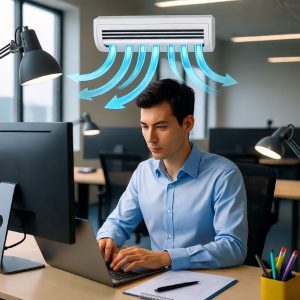 Every breath we take indoors is shaped by the invisible hand of heating, ventilation, and air conditioning. Whether we are studying, sleeping, or working, the air that surrounds us plays a major role in how our bodies and minds perform. HVAC systems quietly create environments where focus sharpens, fatigue fades, and health flourishes. Yet, few people realize just how deeply these systems are tied to human biology and productivity.
Every breath we take indoors is shaped by the invisible hand of heating, ventilation, and air conditioning. Whether we are studying, sleeping, or working, the air that surrounds us plays a major role in how our bodies and minds perform. HVAC systems quietly create environments where focus sharpens, fatigue fades, and health flourishes. Yet, few people realize just how deeply these systems are tied to human biology and productivity.
Modern comfort goes far beyond temperature control, thanks to innovations from services like BPM heating, cooling & plumbing. These technologies regulate humidity, filter airborne particles, and manage airflow — all critical factors in maintaining not just comfort but overall well-being. As science continues to uncover how our internal systems respond to environmental conditions, it becomes clear that HVAC systems do more than manage air. They support the delicate balance between physical health and mental performance.
1. The Physics of Heat Transfer and Airflow
Every HVAC system operates on the science of heat transfer. Warm air moves toward cooler spaces until equilibrium is achieved, and HVAC units guide this process through conduction, convection, and radiation. Proper airflow distribution ensures that air circulates evenly, avoiding cold spots or heat pockets. This balance is vital for maintaining stable internal body temperatures, which directly affect comfort and concentration.
2. Temperature and Brain Function
Even small temperature shifts can affect cognitive performance. Research has shown that offices kept at around 70 to 72 degrees Fahrenheit promote optimal concentration. Warmer conditions slow reaction times and make workers feel sluggish, while cooler air keeps the brain alert. For students, the same principle applies: classrooms with consistent, moderate temperatures see higher test scores and longer attention spans.
3. The Role of Humidity in Respiratory Health
Humidity is the unsung hero of comfort and health. Dry air can irritate the throat, dry out nasal passages, and increase susceptibility to infections. Too much moisture, on the other hand, promotes mold and bacteria growth. A balanced humidity level, typically between 40 and 60 percent, helps the body maintain healthy mucous membranes and supports lung function. HVAC systems are designed to keep this balance steady year-round.
4. Better Sleep Through Climate Control
Temperature directly influences the body’s ability to rest. During sleep, the body’s core temperature drops slightly. A cooler bedroom, maintained between 60 and 67 degrees Fahrenheit, helps trigger this process. HVAC systems that maintain steady nighttime temperatures prevent disruptions in sleep cycles and contribute to deeper, more restorative rest.
5. Air Quality and Mental Clarity
Clean air is essential for mental clarity and focus. Polluted indoor air, filled with dust or volatile compounds, can cause headaches, dizziness, or fatigue. Advanced HVAC filtration systems remove these irritants, increasing oxygen flow to the brain. The result is sharper focus and improved mood, especially in spaces where people spend long hours such as offices or schools.
6. Classroom Comfort and Learning Performance
Temperature and air quality play a measurable role in student learning. Studies show that children perform better on tests when classrooms are well-ventilated and temperature-regulated. HVAC systems reduce CO₂ buildup, allowing more oxygen to circulate, which directly affects alertness and memory retention. Teachers also report improved classroom behavior when air conditions are optimized. For outdoor classrooms or learning spaces, utilizing patio heaters in educational settings can help maintain a comfortable temperature and support student engagement during cooler weather.
7. Energy Efficiency and Health
Efficient systems do more than save money. When HVAC systems operate smoothly, they prevent temperature swings that stress the body. Consistent comfort supports cardiovascular stability and reduces fatigue. Energy-efficient technologies, such as variable-speed fans and smart thermostats, create healthier spaces while cutting energy costs.
8. The Impact of Poor Maintenance
Neglecting HVAC upkeep can have serious consequences. Dirty filters, blocked vents, or leaking ducts reduce airflow and spread contaminants. This leads to respiratory issues, allergies, and even cognitive sluggishness. Regular maintenance by professionals ensures air stays fresh and clean, protecting both the system and the people it serves.
9. How Air Movement Affects Emotion
Air movement influences mood and emotion more than most realize. Stagnant air can make people feel lethargic, while gentle airflow promotes relaxation. Ventilation provides a subtle psychological cue of openness and freshness. That’s why well-designed systems often feel “invisible” — you only notice them when they stop working.
10. The Future of Indoor Climate Science
Tomorrow’s HVAC systems are being built to sync with human biology. New designs use sensors that adjust to body heat, activity levels, and even CO₂ concentration. As our understanding of environmental physiology deepens, HVAC technology will become an active partner in promoting human performance and wellness.
From classrooms to offices, from homes to hospitals, the science of HVAC has reshaped how we live and think. Reliable solutions from BPM heating, cooling & plumbing continue to show that managing air is about far more than comfort. It is about keeping our bodies balanced and our minds clear. The next time you feel a wave of cool air on a summer day, remember, that invisible system is helping your brain perform at its best.